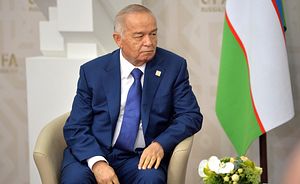A Karimov-less Election in Uzbekistan: Yesterday I outlined what to expect from Uzbekistan’s election: a Mirziyoyev victory and mostly more of the same. Muhammad Tahir, RFE/RL’s media relations manager (former director of their Turkmen service) gathered a podcast panel to discuss the election. Bakhtiyor Nishanov, regional deputy director for Eurasia at the International Republican Institute, Alisher Sidik, the director of RFE/RL’s Uzbek Service, and RFE/RL’s Bruce Pannier had a dynamic discussion about the election, what it means, and what we should and should not expect from the next Uzbek president.
Sidik commented that that December 4 vote is “not about an election, it’s just an approval for current acting President and Prime Minister Shavkat Mirziyaev.” He also suggested that the authorities may fiddle with the results, not to inflate Mirziyoyev win but to lower it — he’ll “get 99 percent; and because they [presumably] don’t want to show that he’s a dictator from the very beginning, they would need to lower his percentage.”
A (Fake) Kyrgyz Scandal: In mid-November, Kyrgyz President Almazbek Atambayev instructed the state to investigate Omurbek Tekebayev, head of the now-in-opposition Ata-Meken party, and two others for corruption. The spark was a document allegedly supplied by the government of Belize that appeared to link Tekebayev and the much-hated Maxim Bakiyev via, of course, a telecom and an offshore company. Tekebayev said the documents were fake and an investigation by EurasiaNet lends credence to his argument. The anatomy of this scandal appears to be that of a fake news story planted to discredit the Kyrgyz opposition in the weeks before a major referendum.
Blood and Goats on the Steppe: Denis Vejas apparently missed meeting Bifatima Dualetova, a Kazakh Sufi shaman, the first time he paid a visit to her home in Ungurtas, a town near the Kyrgyz border. But after being stopped by winter in Tajikistan (and a constantly breaking down van), he returned and ended up staying three months in 2011 at Dualetova’s commune. His pictures are a visceral peek at the rituals and practices of some of the region’s Sufis.
Inside Turkmenistan’ Economic Crisis: Of all the Central Asian states, Turkmenistan is perhaps the hardest to understand. The country’s opacity masks many of its problems. News on Turkmenistan, as I’ve noted before, is so often focused on spectacles: Guinness Records and massive statues. This makes a series of articles, published by Exeter’s Central Asian Studies Network, on the country’s economic situation all the more important.
The author, using a pseudonym to protect their insider access, begins by recounting that Turkmens watched the 2008 global financial meltdown with a sense of detachment but that “ presently Turkmenistan is beginning to realize that it is part of the globe the hard way”:
As is characteristic of this country, the government is most effectively fighting the rumors about the problems rather than the problems themselves. By drawing on the measures the authorities have taken to deny the crisis and how these measures implicate ordinary people, this feature discusses three aspects of the economic crisis in Turkmenistan in three respective parts: the government appears to have run out of cash; its current energy politics is unlikely to yield any sizable revenues; and that there is an increasing authoritarian backlash against the crisis.
For now only the first article — on Ashgabat’s cash crunch — is available. The next two will be published in the coming weeks and promise to shed much-needed light on Turkmenistan.

































